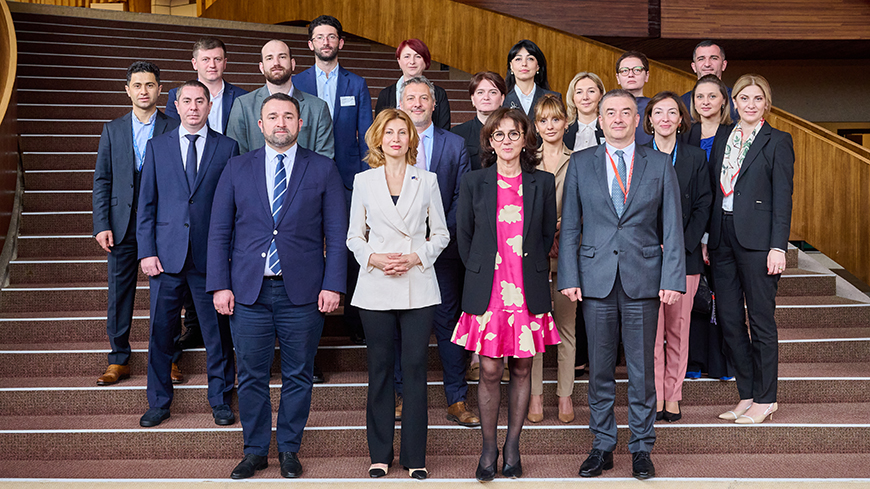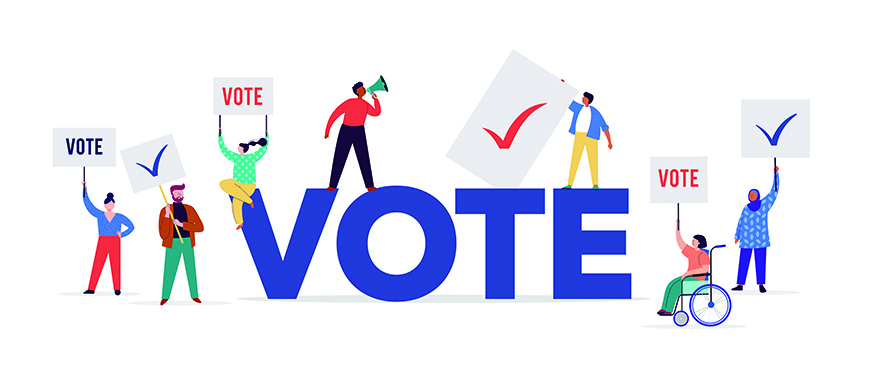A delegation of the Central Election Commission of Georgia visited the Council of Europe Headquarters in Strasbourg for a study visit which focused on the “Modernisation of elections, challenges, and steps forward” and international standards in this regard.
During the two-day visit, the Chairperson of the Central Election Commission, Mr Giorgi Kalandarishvili, the Secretary of the Central Election Commission, Mr Giorgi Javakishvili, and heads of departments and units had the opportunity to delve into the respective policy and legal standards and instruments of the Organisation, as well as good practices of the member States.
The delegation engaged with representatives from different institutions and departments composing the Council of Europe electoral cycle, covering all phases of the electoral process. They heard presentations from, and actively engaged in exchange of views and information with staff from the Secretariat of the Parliamentary Assembly and the Congress of Regional and Local Authorities who detailed the monitoring mechanisms and procedures, and respective election observation missions covering national, local and regional elections; the Venice Commission who presented key documents in the field of elections, in particular the Code of good practice in electoral matters, as well as the recent opinions in the field of elections concerning Georgia, including those on the Agenda of the next plenary sessions of the Council for Democratic Elections [1] (20th June) and the Venice Commission (21-22 June).
To ensure a competitive and healthy electoral environment in line with international standards and good practices, including in the context of the forthcoming Parliamentary Elections in Georgia (26 October2024), the study visit explored various topics such as guaranteeing freedom of assembly and expression, combating misinformation and disinformation, enhancing gender equality with a focus on women's political participation, data protection and artificial intelligence, preventing hate speech and discrimination in elections, and encouraging diversity and inclusion. The delegation also examined appropriate measures to prevent any interference in electoral systems and processes, as well as new voting procedures and technology.
The delegation had the opportunity to meet with Mr Claude Kern (France/ALDE), member of the Parliamentary Assembly and co-rapporteur for Georgia, who outlined the role and functioning of the monitoring procedure of the Parliamentary Assembly and reminded them of Georgia's commitments and obligations as a Council of Europe member State, in particular with regard to the electoral process.
In a meeting with representatives of the European Court of Human Rights, including the Georgian judge Mr. Lado Chanturia, the delegation had the opportunity to be informed about relevant provisions of the European Convention on Human Rights pertaining to elections, particularly Article 3 of Protocol 1 on the “Right to Free Elections” and learned about the latest developments in the court's case law on electoral matters. The presentation was followed by an information and discussion session with the Secretariat of the Department for the Execution of Judgments, which included a detailed explanation of the follow-up and supervision of the execution of judgments of the European Court of Human Rights.
Interventions and discussions stressed the importance of holding democratic elections in line with international standards and recalled the commitment undertaken at the Council of Europe’s Heads of State and Government Summit (Reykjavik, on 16-17 May 2023) to “actively enable and encourage democratic participation at national, regional and local levels through free and fair elections” as defined in the agreed “ Principles of Democracy” .
The study visit was organised within the framework of the Council of Europe Project “Supporting Transparency, Inclusiveness and Integrity of Electoral Practice and Process in Georgia”.
[1] The Council for Democratic Elections, created following the resolution of the Parliamentary Assembly calling for the drafting of a Code of Good Practice in Electoral Matters, is the only tripartite body of the Council of Europe, comprising members of the Venice Commission, the Parliamentary Assembly and the Congress of Local and Regional Authorities of the Council of Europe. The OSCE/ODIHR regularly participates in its work.





